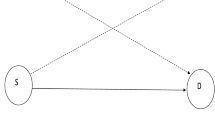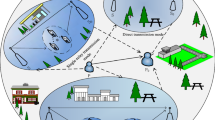Abstract
In this paper, we derive the throughput and Bit Error Probability of incremental relaying for cognitive radio networks. Relaying in the secondary network is performed only when the SNR of the direct link is lower than a predefined threshold \(\beta \). Also, all relays must verify interference constraints: the generated interference to primary receiver must be below a chosen threshold (T) so that the primary throughput is larger than a predefined value. The analysis is valid for different relay selection techniques: Opportunistic amplify and forward, opportunistic decode and forward, partial and reactive AF relay selection. We also consider multihop relaying with single and multiple branches. For multiple branches, two scenarios are considered: all branches are maximum ratio combined or the best branch is activated. We also take into account the interference from primary to secondary nodes. The parameter \(\beta \) of incremental relaying is also numerically optimized to achieve the highest secondary throughput.











Similar content being viewed by others
References
Mitola, J, Jr., & Maguire, G. Q. (1999). Cognitive radio: Making software radios more personal. IEEE Personal Communications, 6(4), 13–18.
FCC. (2002). Spectrum policy task force. Technical Report.
Haykin, S. (2005). Cognitive radio: Brain-empowered wireless communications. IEEE Journal on Selected Areas in Communications, 23, 201–220.
Akyildiz, I. F., Lee, W.-Y., Vuran, M. C., & Mohanty, S. (2006). Next generation/dynamic spectrum access/cognitive radio wileless networks: A survey. Computer Networks, 50(13), 2127–2159.
Laneman, J. N., Tse, D. N. C., & Wornell, G. W. (2004). Cooperative diversity in wireless networks: Efficient protocols and outage behavior. IEEE Transactions on Information Theory, 50(12), 3062–3080.
Liu, J., Chen, W., Cao, Z., & Zhang , Y. J. (2011). Cooperative beamforming aided incremental relaying in cognitive radios. In IEEE ICC.
Tan, X., Zhang, H., Chen, Q., & Hu, J. (2013). Opportunistic channel selection based on time series prediction in cognitive radio networks. Transaction on Emerging Telecommunication Technologies, 17(3), 32–38.
Menon, R., Buehrer, R., & Reed, J. (2005). Outage probability based comparison of underlay and overlay spectrum sharing techniques. In IEEE international symposium on new frontiers in dynamic spectrum access networks, Baltimore (pp. 101–109).
Zou, Y., Zhu, J., Zheng, B., Tang, S., & Yao, Y.-D. (2010). A cognitive transmission scheme with the best relay selection in cognitive radio networks. In IEEE GLOBECOM.
Chamkhia, H., Hasna, M. O., Hamila, R., & Hussain, S. I. (2012). Performance analysis of relay selection schemes in underlay cognitive networks with Decode and Forward relaying. In IEEE PIMRC.
Manna, M. A., Chen, G., & Chambers, J. A. (2014). Outage probability analysis of cognitive relay network with four relay selection and end-to-end performance with modified quasi-orthogonal space-time coding. IET Communications, 8(2), 233–241.
Hussain, S. I., Alouini, M.-S., Hasna, M., & Qaraqe, K. (2012). Partial relay selection in underlay cognitive networks with fixed gain relays (pp. 1–5). Porto: VTC Spring.
Hussain, S. I., Alouini, M. S., Qarage, K., & Hasna, M. (2012). Reactive relay selection in underlay cognitive networks with fixed gain relays. In IEE ICC (pp. 1784–1788).
Liu, J., Chen, W., Cao, Z., & Jun, Y. (2011). Cooperative beamforming aided incremental relaying in cognitive radio. In IEEE ICC.
Jaafar, W., Ajib, W., & Haccoun, D. (2012). Incremental relaying transmissions with relay selection in cognitive radio networks. In IEEE GLOBECM.
Tourki, K., Qaraqe, K. A., & Alouini, M. S. (2013). Outage analysis for underlay cognitive networks using incremental regenerative relaying. IEEE Transactions on Vehicular Technology, 62(2), 721.
Chu, S. I. (2014). Outage probability and DMT performance of underlay cognitive networks with incremental DF and AF relaying over Nakagami-m fading channels. IEEE Communications Letters, 18(1), 62.
Chang, Y., Li, Y., Si, Z., Lu, Y., & Lin, J. (2014). Outage analysis of cognitive DF relay network in Nakagami-m fading channels. Porto: VTC Spring.
Chu, T., Phan, H., & Zepernick, H. J. (2014). Adaptive modulation and coding with queue awareness in cognitive incremental decode-and-forward relay networks. In IEEE ICC.
Majhi, S., & Banerjee, A. (2015). Asymptotic outage analysis of incremental decode and forward cognitive radio relay network. International Conference on Communication Systems and Networks, 1, 2759.
Das, P., & Mehta, N. B. (2015). Revisiting incremental relaying and relay selection for underlay cognitive radio. In IEEE GLOBECOM.
Al-Qahtani, F. S., Radaydeh, R. M., Hessien, S., Duong, T. Q., & Alnuweiri, H. (2017). Underlay cognitive multihop MIMO networks with and without receive interference cancellation. IEEE Transactions on Communications, 65(4), 1477–1493.
Mondal, S., Roy, S. D., & Kundu, S. (2017). Primary behaviour-based energy harvesting multihop cognitive radio network. IET Communications, 11(16), 2466–2475.
Dutta, A. K., Hari, K. V. S., Murthy, C. R., Mehta, N. B., & HanzoMinimum, L. (2017). Error probability MIMO-aided relaying: Multihop, parallel, and cognitive designs. IEEE Transactions on Vehicular Technology, 66(6), 5435–5440.
Avdar, T., Sadreddini, Z., & Guler, E. (2018). Pre-reservation based spectrum allocation for cognitive radio network. Telecommunication Systems, 68(4), 723–743.
Kandelusy, O. M., & Andargoli, S. M. H. (2018). Cognitive relay network with several primary receivers and outdated CSI: A new spectrum sharing constraint. Telecommunication Systems, 68(3), 385–392.
Poornima, S., & Babu, A. V. (2018). Performance analysis of energy harvesting cognitive relay networks with primary interference. Telecommunication Systems, 68(3), 445–459.
Ranjeeth, M., & Anuradha, S. (2018). The effect of Weibull fading channel on cooperative spectrum sensing network using an improved energy detector. Telecommunication Systems, 68(3), 493–512.
Ho-Van, K., & Do-Dac, T. (2018). Joint effect of artificial noise and primary interference on security performance of cognitive radio networks. Telecommunication Systems, 68(3), 593–603.
Hasna, M. O., & Alouini, M.-S. (2003). Outage probability of multihop transmission over Nakagami fading channels. IEEE Communications Letters, 7(5), 216–218.
Ben Said, M., Boujemaa, H., & Siala, M. (2005). Throughput performance of ARQ and HARQI schemes over a two states Markov channel model. In Gammarth, ICECS.
Boujemaa, H. (2010). Exact symbol error probability of cooperative systems with partial relay selection. European Transactions on Telecommunications, 21, 79–85.
Proakis, J. (2007). Digital communications (5th ed.). New York City: Mac Graw-Hill.
Author information
Authors and Affiliations
Corresponding author
Ethics declarations
Conflict of interest
On behalf of all authors, the corresponding author states that there is no conflict of interest.
Appendix A
Appendix A
PDF of \(Z^{up}=\Gamma _{SD}+\Gamma _{SRD}^{up}|\Gamma _{SD}<\beta \).
Notice that \(\Gamma _{SRD}^{up}\) is exponentially distributed. If \(z<\beta ,\) the previous integral becomes
When \(z>\beta \),
Rights and permissions
About this article
Cite this article
Alnwaimi, G., Boujemaa, H. Throughput analysis and optimization of cognitive radio networks using incremental relaying. Telecommun Syst 71, 231–247 (2019). https://doi.org/10.1007/s11235-018-0527-0
Published:
Issue Date:
DOI: https://doi.org/10.1007/s11235-018-0527-0




